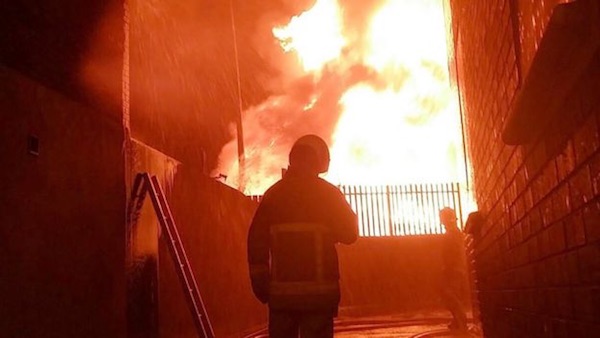
Last night saw an almost 50% increase in bonfire-related emergency callouts since last year as state-funded loyalist ‘Eleventh Night’ blazes damaged property and threatened lives across the North.
Firefighters were summoned to 133 emergency situations last night, a 49% increase in the number of incidents over the same period in 2016.
There were chaotic scenes in Belfast city centre, where residents fled one high rise development as a giant bonfire at Victoria Place looked set to engulf a building just yards away.
Fire crews soaked the high-rise development for hours and succeeded in preventing a disaster, although heat damage included cracked windows and melted plastics.
It is thought the building, which is home to a diverse and international mix of young professionals and their families, may have been deliberately targeted in an act of racism.
Lucy Ryan was inside the apartment complex when panic spread. She said: “We were standing on the first floor, looking out onto the bonfire and saw it all collapse. Obviously we felt the heat and we saw the fire was literally coming right over to the building, so we were like ‘right, we have to get out’.”
Before being lit, in scenes mirrored in loyalist areas across the North, symbols of Irish nationalism such as tricolours, Celtic FC banners and Sinn Fein election poster were added to the bonfire in the traditional expression of sectarian hate and intimidation.
“All the glazing [on the apartment block] facing the bonfire has been damaged and cracked,” said Assistant chief fire officer Alan Walmsley of the Victoria Place bonfire. “If our crews had not been on the scene working so hard, there is no doubt that fire would have spread into that building.”
Firefighters were attacked as they left the scene by members of the paramilitary gang, one of those which receives Belfast City Council’s infamous grant aid for loyalists criminals. This week the council announced it was pulling some of its financial support for the group via the euphemistically titled “Sandy Row Fun Day” event, blaming a nearby bonfire at Roden Street, which had been constructed to an unprecedented height.
However, the city council backed away from its threat to prevent four bonfires they fund in east Belfast from being increased, despite receiving a court order to permit them to intervene to limit their height. Masked gang members were photographed defying the council posing by piling on wooden pallets.
Authorities instead focused on mitigating the damage of the pyres by boarding up windows at a number of the sites, including Ravenscroft Avenue and Cregagh in the east of the city and Lanark Way in the north. At Cluan Place in east Belfast, where thick black fumes from burning tyres filled the area and spread into the nationalist Short Strand, firefighters also spent hours soaking properties to prevent them from catching fire.
Meanwhile, Sinn Fein’s national chairperson Declan Kearney called on unionist politicians to condemn “hatemongers” who put a replica coffin bearing the image of Martin McGuinness, who died in March, on a bonfire in east Belfast.
A replica casket with a picture of the former deputy first minister Martin McGuinness was hung on a bonfire in east Belfast.
John Finucane, the son of loyalist murder victim Pat Finucane and a new Sinn Fein candidate in the recent general election, reported a hate crime and theft to the police after learning that a number of his campaign posters had been attached to a bonfire.
One pyre in County Tyrone was completely covered in stolen election posters belonging to Sinn Fein, the SDLP, the Alliance Party and the Green Party.
Images also emerged on social media of a bonfire in east Belfast draped with a banner carrying a racist message directed at Celtic footballer Scott Sinclair.
“I am directly challenging the leaders of all unionist parties to immediately disassociate themselves and their parties from this and other examples of sectarian hate crime,” Mr Kearney said.
![[Irish Republican News]](https://republican-news.org/graphics/title_gifs/rn.gif)
![[Irish Republican News]](https://republican-news.org/graphics/title_gifs/harp.gif)

